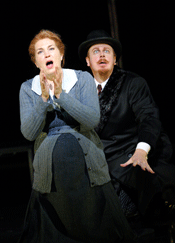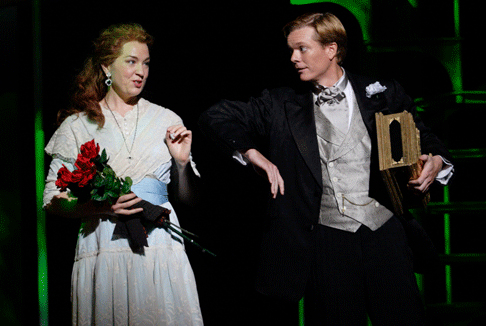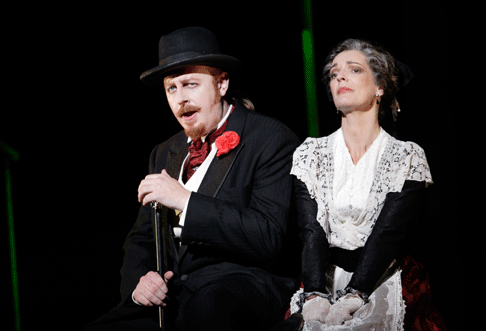Recently in Performances
English Touring Opera are delighted to announce a season of lyric monodramas to tour nationally from October to December. The season features music for solo singer and piano by Argento, Britten, Tippett and Shostakovich with a bold and inventive approach to making opera during social distancing.
This tenth of ten Live from London concerts was in fact a recorded live performance from California. It was no less enjoyable for that, and it was also uplifting to learn that this wasn’t in fact the ‘last’ LfL event that we will be able to enjoy, courtesy of VOCES8 and their fellow vocal ensembles (more below …).
Ever since Wigmore Hall announced their superb series of autumn concerts, all streamed live and available free of charge, I’d been looking forward to this song recital by Ian Bostridge and Imogen Cooper.
Although Stile Antico’s programme article for their Live from London recital introduced their selection from the many treasures of the English Renaissance in the context of the theological debates and upheavals of the Tudor and Elizabethan years, their performance was more evocative of private chamber music than of public liturgy.
Evidently, face masks don’t stifle appreciative “Bravo!”s. And, reducing audience numbers doesn’t lower the volume of such acclamations. For, the audience at Wigmore Hall gave soprano Elizabeth Llewellyn and pianist Simon Lepper a greatly deserved warm reception and hearty response following this lunchtime recital of late-Romantic song.
For this week’s Live from London vocal recital we moved from the home of VOCES8, St Anne and St Agnes in the City of London, to Kings Place, where The Sixteen - who have been associate artists at the venue for some time - presented a programme of music and words bound together by the theme of ‘reflection’.
'Such is your divine Disposation that both you excellently understand, and royally entertaine the Exercise of Musicke.’
‘And there was war in heaven: Michael and his angels fought against the dragon; and the dragon fought and his angels, And prevailed not; neither was their place found any more in heaven … that old serpent … Satan, which deceiveth the whole world: he was cast out into the earth, and his angels were cast out with him.’
There was never any doubt that the fifth of the twelve Met Stars Live in Concert broadcasts was going to be a palpably intense and vivid event, as well as a musically stunning and theatrically enervating experience.
‘Love’ was the theme for this Live from London performance by Apollo5. Given the complexity and diversity of that human emotion, and Apollo5’s reputation for versatility and diverse repertoire, ranging from Renaissance choral music to jazz, from contemporary classical works to popular song, it was no surprise that their programme spanned 500 years and several musical styles.
The Academy of St Martin in the Fields have titled their autumn series of eight concerts - which are taking place at 5pm and 7.30pm on two Saturdays each month at their home venue in Trafalgar Square, and being filmed for streaming the following Thursday - ‘re:connect’.
The London Symphony Orchestra opened their Autumn 2020 season with a homage to Oliver Knussen, who died at the age of 66 in July 2018. The programme traced a national musical lineage through the twentieth century, from Britten to Knussen, on to Mark-Anthony Turnage, and entwining the LSO and Rattle too.
With the Live from London digital vocal festival entering the second half of the series, the festival’s host, VOCES8, returned to their home at St Annes and St Agnes in the City of London to present a sequence of ‘Choral Dances’ - vocal music inspired by dance, embracing diverse genres from the Renaissance madrigal to swing jazz.
Just a few unison string wriggles from the opening of Mozart’s overture to Le nozze di Figaro are enough to make any opera-lover perch on the edge of their seat, in excited anticipation of the drama in music to come, so there could be no other curtain-raiser for this Gala Concert at the Royal Opera House, the latest instalment from ‘their House’ to ‘our houses’.
"Before the ending of the day, creator of all things, we pray that, with your accustomed mercy, you may watch over us."
The doors at The Metropolitan Opera will not open to live audiences until 2021 at the earliest, and the likelihood of normal operatic life resuming in cities around the world looks but a distant dream at present. But, while we may not be invited from our homes into the opera house for some time yet, with its free daily screenings of past productions and its pay-per-view Met Stars Live in Concert series, the Met continues to bring opera into our homes.
Music-making at this year’s Grange Festival Opera may have fallen silent in June and July, but the country house and extensive grounds of The Grange provided an ideal setting for a weekend of twelve specially conceived ‘promenade’ performances encompassing music and dance.
There’s a “slide of harmony” and “all the bones leave your body at that moment and you collapse to the floor, it’s so extraordinary.”
“Music for a while, shall all your cares beguile.”
The hum of bees rising from myriad scented blooms; gentle strains of birdsong; the cheerful chatter of picnickers beside a still lake; decorous thwacks of leather on willow; song and music floating through the warm evening air.
Performances
![Toby Spence and Iain Paterson [Photo by Catherine Ashmore courtesy of English National Opera]](http://www.operatoday.com/Faust_ENO_02.gif)
29 Sep 2010
Faust by ENO
Perhaps because the rather stolidly Victorian character of both its music
and its morality, Gounod’s Faust has been out of fashion in the
UK in recent decades, and owes a debt to David McVicar and his darkly Gothic
production for the Royal Opera in 2004 (now, at last, available on DVD) for the
restoration of its footing in the standard repertoire.
ENO has entrusted its new production to Des McAnuff, best-known in London
for the musical Jersey Boys which is currently enjoying a long run at the
Prince Edward Theatre. The only toe he has thus far dipped in the operatic
water was a production of Wozzeck in San Diego last year — not a
piece that would come automatically to mind for a novice opera director. An
eclectic history, promising more than some of the guest directors engaged by
ENO in the recent past. McAnuff fixes the starting point of the opera in a WW2
atomic bomb laboratory. It is easy to believe how an ageing scientist would be
left feeling unfulfilled after devoting his life and career to an inherently
cold-blooded and inhuman vocation.
Faust’s reversion to youth appears to take him back to the early days
of WW1 — though a few obviously intentional anachronisms make the period
somewhat indistinct — and initially it is a romanticised vision of jolly
carousing soldiers with their girls in dirndl skirts and flouncy blouses. The
love scene is idealised even further, with intense coloured lighting, and
flowers appearing to spring up at will on the projected backdrop. From that
point forwards the scales start to fall from Faust’s eyes and time seems
to be sped up; the colour is blanched from the scene, Marguerite seems to age
several years in the few months that elapse between Acts 3 and 4, and even more
between then and the final scene. The perky soldiers of the Act 2 tavern scene
are almost unrecognisable when they return from duty, old and bent and going
crazy with shell-shock.
 Melody Moore and Iain Paterson
Melody Moore and Iain Paterson
In the title role, Toby Spence was a revelation. His attractive stage
presence, clarity of delivery and impeccable diction have never been in
question, but Faust is a fuller lyric role than Spence has been used to, and I
feared his voice may simply be swamped by the orchestra or vanish into the
further reaches of the Coliseum’s vast auditorium. But in the event, the
fullness of his sound at the very beginning had me worried that he might be
over-singing, and I was relieved when the sound seemed to settle down, easily
big enough for the occasion but retaining his trademark bright, youthful sound,
right up to a splendidly confident high C in ‘Salut, demeure’. It
is not the most flexible or nuanced sound, nor does it sound French —
I’m not sure it’s possible to when singing in English translation
— but it was confident, romantic and hugely enjoyable.
Iain Paterson was a congenial Mephistopheles, more gentleman than devil I
felt, and he’s got the stage presence for the role. Although his lowest
notes lack power (he’s a bass-baritone rather than a bass) he turned in
an exceptionally stylish vocal performance.
 Melody Moore and Toby Spence
Melody Moore and Toby Spence
The American soprano Melody Moore made a disappointing first impression as
Marguerite (rendered in the surtitles as Margarita, though the principals
seemed to be approximating the French pronunciation); there is something
invulnerable and unyielding about her vocal quality which makes her difficult
to engage with, and she made hard work of the Jewel Song. She did come into her
own in the final scene, where the same qualities that had earlier been
frustrating made for an effectively steadfast ‘Anges purs’.
Benedict Nelson’s Valentin was secure and simply effective in
‘Avant de quitter ces lieux’, and Anna Grevelius’s charmingly
androgynous Siebel was beautifully-sung.
 Iain Paterson and Pamela Helen Stephen
Iain Paterson and Pamela Helen Stephen
Ed Gardner struck the right balance with the score, neither too heavy-handed
in the rhythmic numbers nor too over-indulgent in the lyrical ones. Only
‘Le veau d’or’ didn’t quite have the drive to take
flight.
McAnuff’s production worked for me for the most part, though it was
disappointing that he opted to cut the Walpurgisnacht ballet altogether —
all that remained of the scene was an episode in which Mephistopheles shows
Faust a group of tortured souls writhing round a table. If going down the
historically-informed opera ballet route doesn’t appeal (and frankly, why
would it?) surely the ballet is the greatest opportunity for a director and his
choreographer to add to the audience’s understanding, or to crystallize
their production concept in the form of a vignette?
At the end, with Marguerite redeemed and Faust dragged down by
Mephistopheles through a Don Giovanni-style trapdoor, we see the elderly Faust
appearing in his laboratory, collapsing after apparently having drained the cup
of poison from the start of the opera. Was his whole adventure into youth and
corruption, then, just the hallucination of a poisoned and dying man? The
elixir of youth to which Mephistopheles transforms Faust’s deadly draught
is poison of one sort or another, whether its effect be physical or moral, and
either way, Faust ends up back where he started.
Ruth Elleson © 2010
![Toby Spence and Iain Paterson [Photo by Catherine Ashmore courtesy of English National Opera]](http://www.operatoday.com/Faust_ENO_02.gif)


